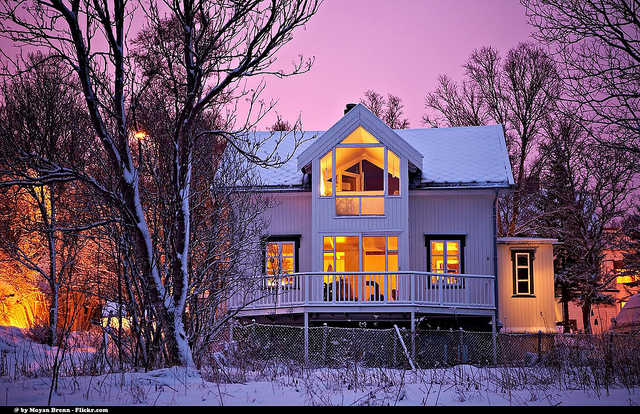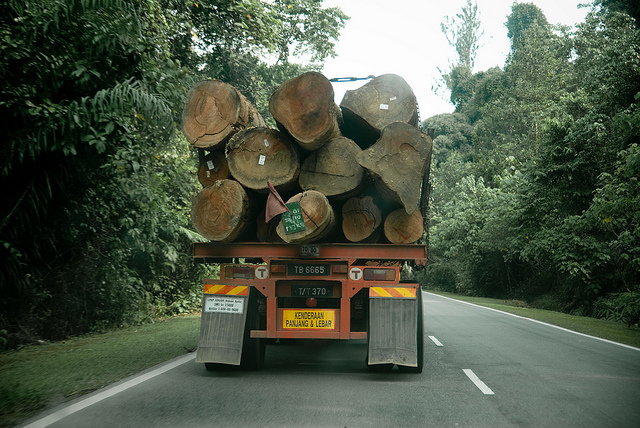
“Here goes lumber from the Maine woods…pine, spruce, cedar, – first, second, third, and fourth qualities, so lately all of one quality, to wave over the bear, and moose, and caribou…” ~ Henry David Thoreau, 1845.
~
When we think about deforestation, our minds wander, no doubt, to the depths of the Amazon, or the dense forests of East Africa.
Although some of the countries with these important ecological treasures have begun taking measures to save their most valuable natural resource, it is not a country in South America or Africa that is leading the march toward saving our planet’s forests.
Instead, it is Norway that has become the first country in the world to pledge to stop the clear-cutting of trees and to find alternative, eco-friendly sources for products like palm oil, soy, beef and wood. This is a huge step toward changing the tide for global climate change and environmental exploitation of our fragile natural balance.
The pledge, signed by Norway’s Parliament May 26, 2016, was a clear sign that Norway intends to hold the commitment to the environment that it made during the U.N. Climate Summit in 2014. Only Germany and the United Kingdom stood beside Norway by making the same commitment at the summit.
Norway’s pledge is a big deal for all of us. Palm oil, soy, beef and wood products are responsible for just under half of the deforestation going on in the world today.

Worth Saving
Forests are the lungs of the earth, removing carbon dioxide from the atmosphere and converting it to oxygen for us all to breathe. They also provide homes for a tremendous number of the earth’s creatures and provide a space where biodiversity creates healthy ecosystems.
Thirty-one percent of the land on the planet is covered in forest, yet that number is quickly falling. In the last century, we have lost half of the forests that once covered land from Asia to Africa, and from Alaska to Argentina. Every year, an estimated 46,000 to 58,000 square miles of forest—48 football fields each minute—are lost due to clear cutting and production of commodities like palm oil, beef and soybeans.
It’s not just the ecosystems that are lost. Greenhouse gas emissions are also affected.
The U.S. Congressional Budget Office, a non-partisan analytical arm for the U.S. Congress, issued a report in 2012 noting:
“Human activities produce large amounts of greenhouse gases (GHGs), primarily carbon dioxide (CO2), and thus contribute to global warming. The use of fossil fuels is the primary source of CO2 emissions, but the removal of trees from forested land has also contributed.”
World Wildlife Fund also blames deforestation for disrupting precipitation and river flow, and contributing to erosion.
This latest commitment by Norway is just one in a long line of efforts the country’s lawmakers have made to lead the way in conservation efforts.
In 2008, Norway granted Brazil a total of one billion dollars to put toward stopping deforestation in the Amazon. Brazil responded by cutting destruction by an astounding 75 percent over a seven-year period.
Brazil has not been the only country Norwegians have assisted. The government announced a $250 million commitment to protect Guyana’s rainforests too, according to WorldWatch Institute, and they pledged $150 million to Liberia to stop deforestation, the first incentive of its kind in an African country.
Norway is taking personal responsibility, too. This month, lawmakers passed a tentative agreement to restrict the sale of gas-powered cars by 2025.
So where does the United States fit in to this equation?
The U.S. is doing pretty well on preserving forests since the mid-1900s. Although most of the old growth forests that once existed are gone, efforts have been made to better manage deforestation and plant new trees where old stands have been felled. Still, 29 percent of the forests that once covered the U.S. are gone.
And in the U.S., while lawmakers debate over whether or not climate change is real, the United States continues to lead the world in CO2 emissions, second only to China.
We can only hope that Norway serves as a positive example of global citizenship, and that commoditization of the world’s forests is trumped by the best interest of the entire planet.
Only time will tell—and it is time and trees that we are increasingly short on.
Author: Amanda Christmann
Image: Moyan Brenn/Flickr, Yusmar Yahaya/Flickr
Editors: Catherine Monkman; Yoli Ramazzina






Read 0 comments and reply